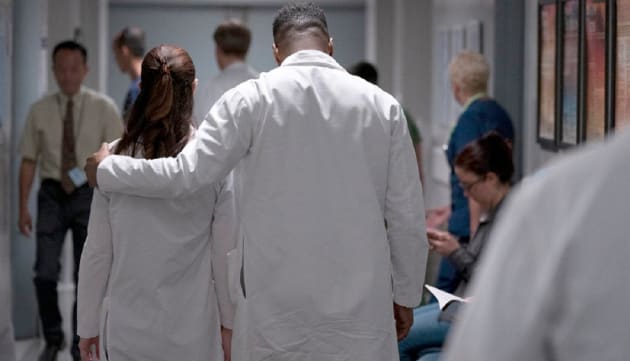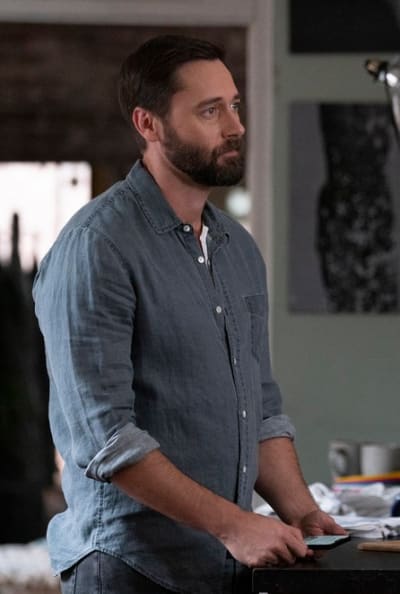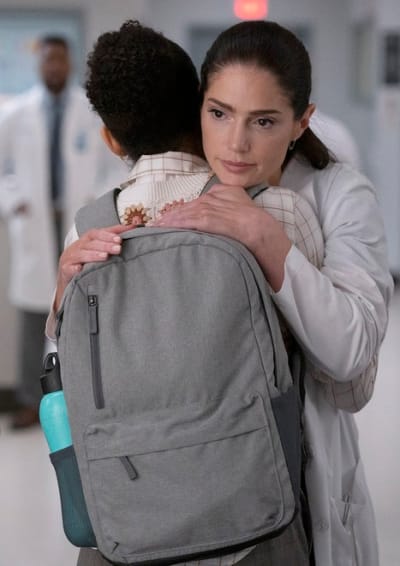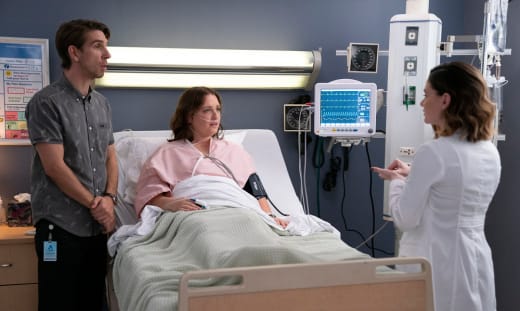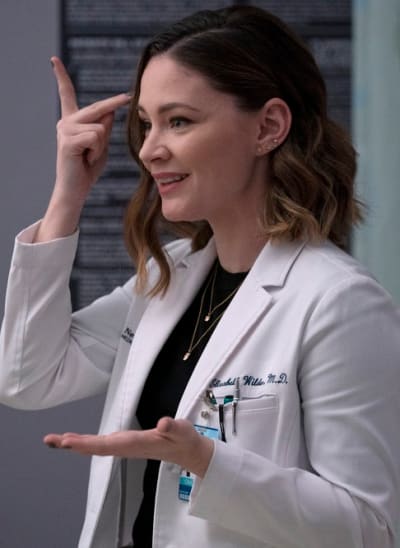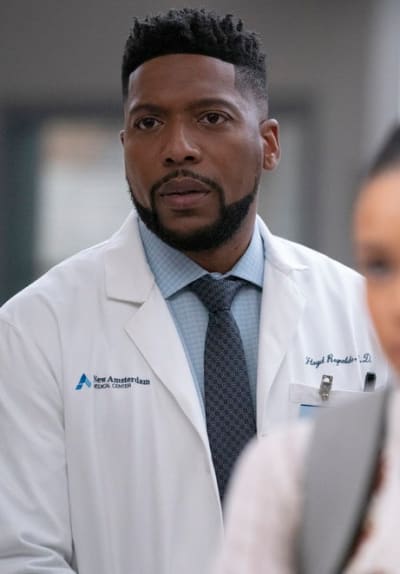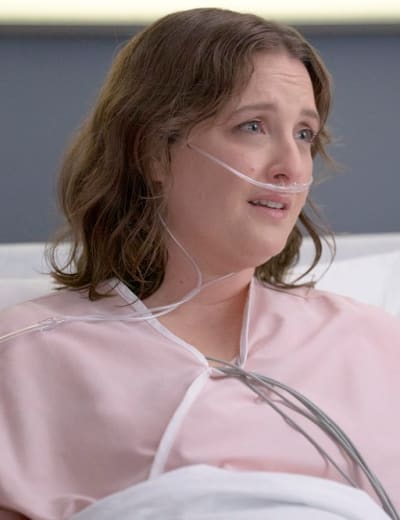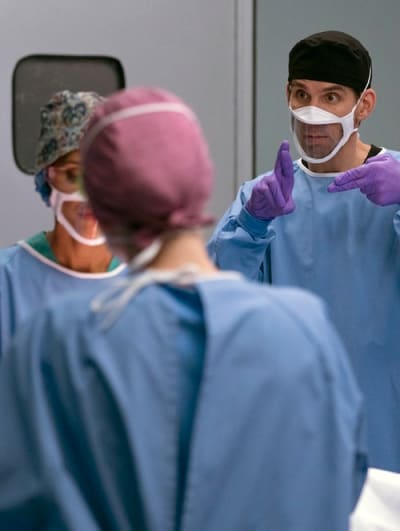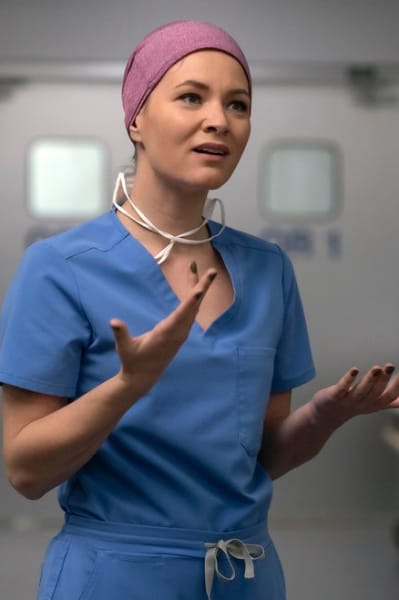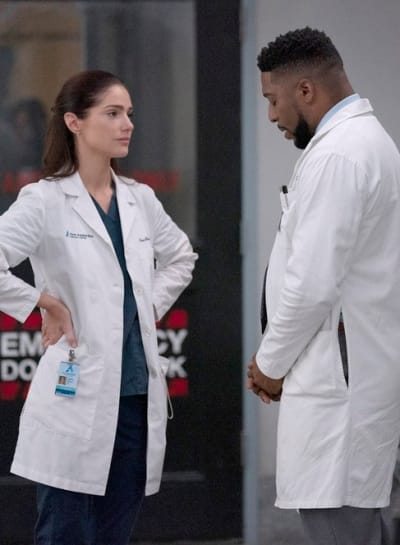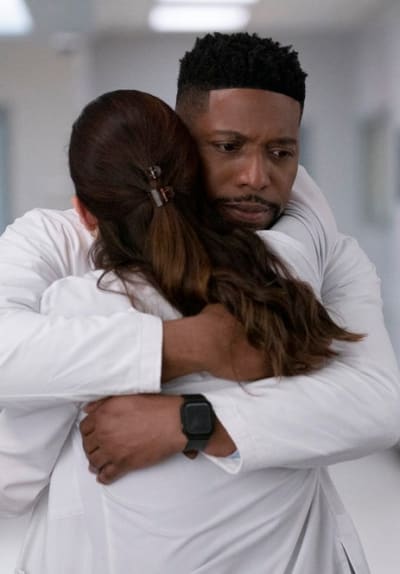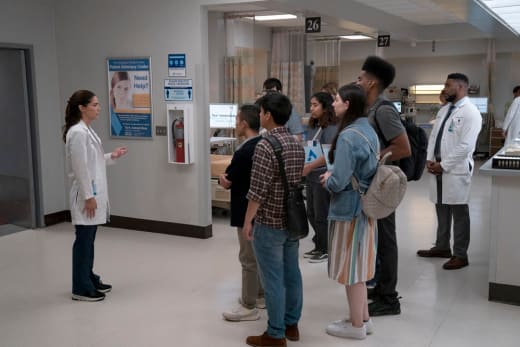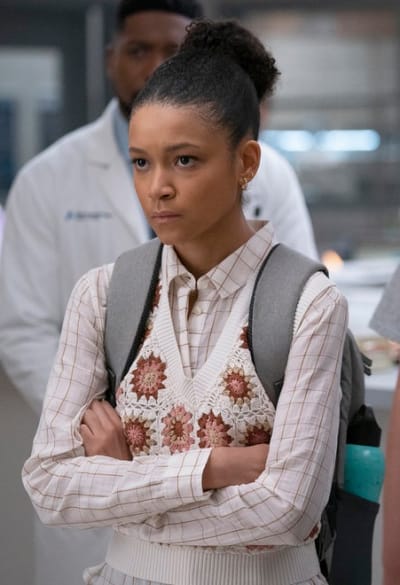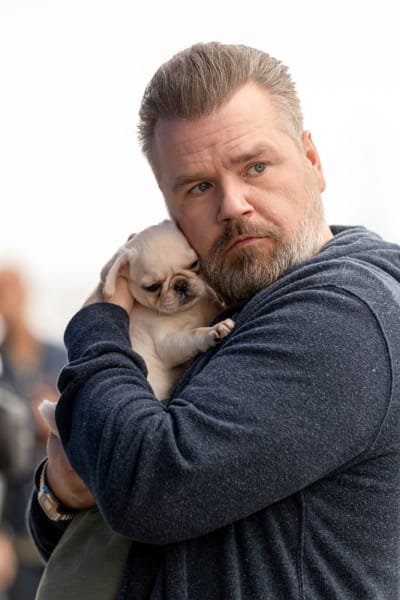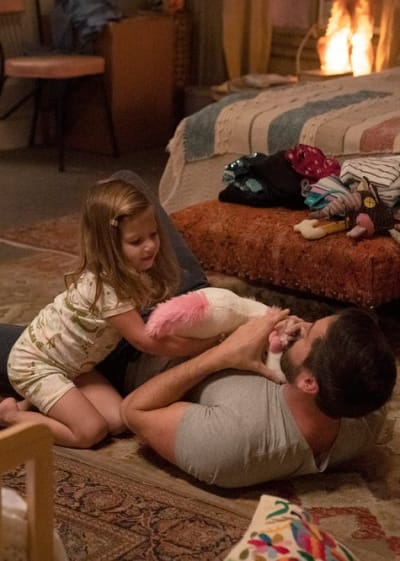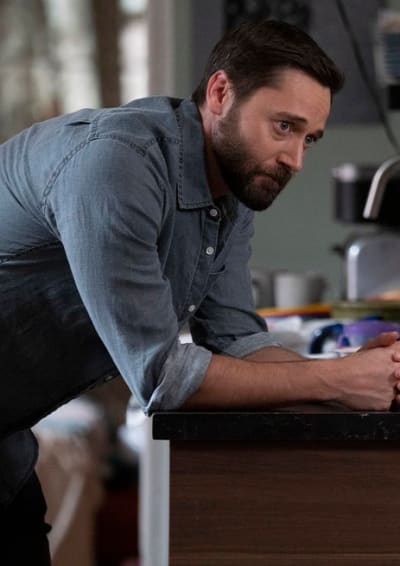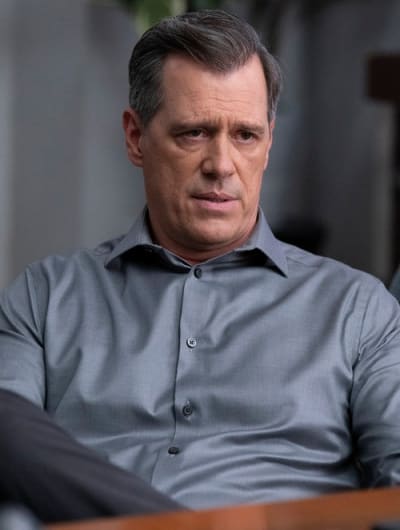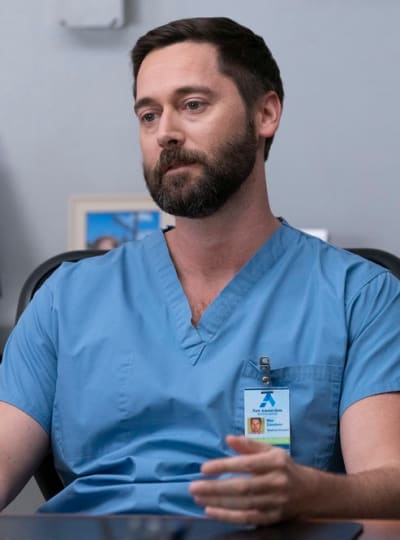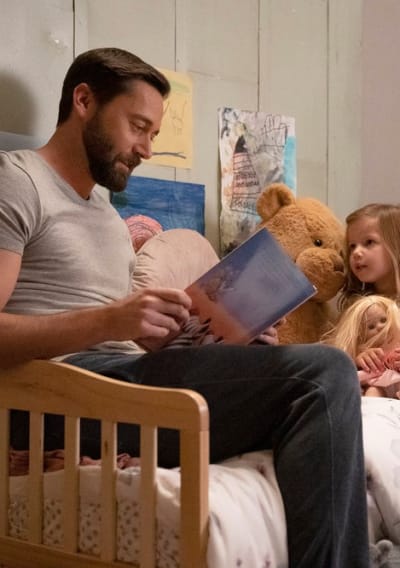New Amsterdam took a bold swing with this landmark installment.
They went for a nuanced but topical hour as New Amsterdam Season 5 Episode 7 focused on the personal and professional ramifications of the overturning of Roe v. Wade.
And we got what is undoubtedly a polarizing hour, but in this case, it was meant to be that way.
The direction of this hour was strong, thanks to Shiri Appleby. One thing that stood out, in particular, was the opening scene of Max and the others as they initially found out that the Supreme Court overturned Roe v. Wade.
We were treated to a silent montage of this news affecting the most prominent characters and how it all came together as they did in the halls of New Amsterdam as they watched the news, still in stunned belief before Karen barked out that they should get back to work.
It was an arresting scene, albeit incredibly dramatic, and it was to set the tone for the rest of the hour.
It’s not surprising for a medical drama to venture into this territory when it’s such a monumental decision with far-reaching ramifications that affects them directly and their millions of patients.
Other medical dramas have not yet devoted a full installment to this issue, but they’ve made their references along the way.
In some ways, that can be preferable because sometimes you don’t know what to say. What is there to say? What is there to say that isn’t already getting said repeatedly?
The hour tried to capture the helplessness of where we are as a society after this decision. It also attempts to leave hints of hope that became a signature for this series over the years.
I can respect their attempt and the stance they wanted to make and bring to an art form with an installment like this. They even worked to provide some nuance to the situation, particularly with Wilder’s patient. Montgomery, Frank, and Monk were particular standouts.
Karen: We fought and fought and in 1973, we won. I can’t believe we’re back here again.
Max: how is this the world that Luna has to grow up in?
Karen: I’m sorry, Max. I shouldn’t have asked you to try to fix this. It wasn’t fair. It wasn’t realistic. What can one person do?
And we know that there is no pleasing everyone or anyone with an hour like this when regardless of someone’s perspective, they’ll walk away frustrated or more.
One of the glaring aspects of this hour was it served as a reminder of how thin the cast is in these final days. With a topic that heavily focuses on women’s health, New Amsterdam lacks those specific voices.
We only have two primary female characters now with Wilder and Lauren, meaning they have to carry the bulk of a storyline like this, assuming that’s the angle the writers want to go in.
Karen had more presence than usual, but Gladys was simply background support for Iggy. Agnes was non-existant. We still don’t know what happened to Mia, who vanished, leaving a concerning unfinished storyline that heavily she might suffer from suicidal ideation. And Helen is gone.
And none of the other characters are familiar or routine enough to have much of a presence.
The cancer is not killing her; politics are. I don’t have a cure for that? Does anyone?
Wilder
With a hard-hitting hour focused on an issue like this, it could’ve been the perfect time to push their female and uterus-having characters to the forefront — make it a landmark in more ways than one, and provide a refreshing take on something that resonants with the viewers long after the credits roll.
And while this wasn’t a terrible hour, and there were some heartfelt moments, scenes, quotes, and so forth, I would be dishonest with you if I said I would remember this installment after this.
Given the subject matter, you want it to be something worth remembering.
Even tying the storylines in with women like Karen and Lauren didn’t change how the men dominated a lot of this hour. The irony is that Lauren gave a misplaced speech (more on that in a bit) about even when it’s supposed to be about women; it’s about them.
Most of the hour was about how this news affected Max, who, as a Girl Dad, worried about the world his daughter would grow up in as he tried to enact change.
Floyd was processing his feelings about the news that he and Lauren could’ve had a child.
Iggy devoted himself to a new cause and had to come to grips with the situation because of the trickle-down effect of how it’d impact him and his family as a gay man if or when the undoing of his rights was next.
Wilder had the most fitting storyline for this. She and her patient got centered, but that didn’t come without its faults.
They were decent in ensuring that Michelle wasn’t some one-dimensional caricature of a patient who was so vastly lost in her own delusions that she’d jeopardize her health.
Michelle wasn’t set up as a character that they made a mockery of and projected the viewpoints about the issue of the hour onto in the way of proving that they were right and she was wrong.
Well, to be specific, she didn’t stay that way. Her opener as a woman who gleefully explained that she was celebrating the overturning ahead of her check-up was designed to make us loathe her.
They toned it down afterward, mainly when she explained that this wasn’t solely some political thing for her by way of life and something of which she’s passionate and is a piece of her.
Do you know what I was doing this morning before I came here for what was supposed to be a routine checkup? I was with my friends celebrating the end of Roe v. Wade. I’m not having an abortion, Dr. Wilder, not today, not ever.
Michelle
Her case would’ve been much stronger if they didn’t have her coming in as strongly as she did. Because for a woman who wanted her choices respected, the irony wasn’t lost here that in her pro-life stance, she wanted pro-choice results. She didn’t have to get an abortion, but who is she to celebrate that others can’t?
As Iggy pointed out in his inner rant, he never got to divulge; entire demographics lost rights on this — the naysayers didn’t, so celebrating the stripping of them is something else.
Once toned down, Michelle was a woman of conviction, not unlike the others with opposing views. At least, that’s what they were angling to present. She appealed to Wilder as a woman of firm conviction, passion, and beliefs, too.
Wilder could think of many things that are so fundamentally a part of her that she’d rather die than compromise. It helped her respect Michelle more, even if she didn’t like it.
I can say Wilder is a better woman than the random other doctor and surgical staff members who were frustrated, a better woman than I, and a better woman than who she was a few episodes ago.
Because, to be perfectly honest, and coinciding with the point about how the limited female characters mean things got projected on the ones there, Wilder suddenly respecting this woman’s choice and agency now when she failed to do so in two different instances with the ball player and blood donor is nuts.
Wilder respected and indulged this woman to a fault in many ways, especially since the result was the same. Michelle left, still pregnant and riddled with cancer, denying chemo and seeking someone else for help.
And the hospital is down resources and money when they’re already struggling and can only envision more issues in the future because of the court decision.
Lauren: It’s what happens every time. Every time men, good men, have a conversation about abortion, it’s all women’s rights, and we’re you’re ally right up until it affects them. That is what is happening here, Floyd. Because we’re not talking about my abortion, are we? No, we’re talking about how you feel about my abortion. We’re suddenly and not surprisingly taking care of you.
Floyd: OK, what were your feelings about it?
Lauren: My feelings? I didn’t have any. It was not a big deal.
Floyd: If it wasn’t a big deal, why did it take you five years to tell me about it?
Michelle will die, and a child will come into this world without a mother, the knowledge and guilt that their mother died for them hanging over their head their entire lives, and whatever long-term effects continue from there.
We’ve known Wilder to defy patients, break the rules, and even attempt illegal things for the sole purpose of saving a patient, so to suddenly and abruptly have her play this role without hesitation feels inauthentic to who she was literally two episodes ago, and is enough to give a person whiplash.
I don’t know if that was some act of nobility in the end. Was it noble to indulge this patient instead of letting Michelle leave as she desired?
She may have maxed out her insurance on a surgery that didn’t save her, but she’s now left with new ailments and things to maintain, like coloscopy bags, and the hospital used up resources that could’ve gone to someone they could’ve helped.
The doctors and surgical members challenging Wilder would’ve hit better if we knew who they were and there was a genuine conflict with something at stake between colleagues. We won’t see them again to care how this will impact things.
And Lauren, in this instance, as one of the only female characters in the series, suffered from what feels like more trauma dumping simply because they didn’t have anyone to give it to here.
Of course, the recovering addict with a troubled background is the one who had two abortions. And the situation with Floyd wasn’t enough, as they had to add in the college incident, which evokes the necessary shudders at what may or may not have happened while she was blacked out that resulted in an abortion.
I understand why they needed a character we know and love to represent that of someone who has had an abortion, and it certainly adds value to an installment that focuses on the issue.
However, they lob so much traumatic stuff onto this character and don’t spend half as much time helping her unpack any of it, which is just a lot sometimes, too much.
We followed Lauren and Floyd the entire installment as they bickered in between, showing students aspiring to be in the industry around.
Floyd discovered via Lauren’s conversation that she had an abortion after they were together, and he was reeling from the news.
It may be an unpopular opinion to voice. Still, it struck me as odd that Lauren immediately started jumping down his throat and touting things about feminism, sexism, and so forth when there was literally nothing wrong with Floyd simply processing this brand-new information.
Lauren: Forget about all the women out there with unwanted or dangerous pregnancies. Forget about my own life.
Floyd: Your own life?
Lauren: Yeah, it was a while ago., I was addicted to Adderall.I couldn’t be pregnant, and I couldn’t be someone’s mother. Floyd: When was that?
Lauren: It was a while ago. Why does it matter?
Floyd: Wasn’t that when we were together?
At no point did he outright say that he wouldn’t have supported her decision or that he was angry at her for it. He was shocked and trying to understand that situation and why, as one of his best friends, she hadn’t told him about it in the past five years.
The narrative didn’t want to make Floyd look like a bad guy or poor ally. Although, they forgot themselves for a bit when he somehow couldn’t remember the name or field of the female doctor he’s worked with countless times.
But in the interim, they seemingly had Lauren spouting off all these things about poor allyship and men’s reactions. While the dialogue generally wasn’t untrue, it didn’t apply to their specific situation, so it felt out of nowhere and contrived.
It’s unfair to say that her having an abortion five years ago became about his feelings presently when he’s merely processing the news. If he behaved a certain way when it happened, so be it.
I’ve had two abortions. Got my first when I was in college. I was 20. Someone slipped something in my drink, and I woke up in a stranger’s bed with no memory of what had happened to me. And I got the second one around five years ago. I was falling in love with someone who would have made an amazing father, but he told me that I didn’t fit into his future. Those were both very difficult times for me. But deciding whether or not to have an abortion, that was clear. And I was able to do the right, responsible thing, and I was able to get it done responsibly and quickly. But you know what? The circumstances, they shouldn’t even matter. You should be able to get an abortion simply because you are pregnant, and you didn’t want to be. That’s the very definition of choice.
Lauren
However, it wasn’t about his feelings in the five years since it happened, so should he not have a right to his reaction now?
Lauren wasn’t in a place for a child and didn’t want one. And she’s absolutely right about what Floyd told her. He made his feelings about how unserious they were very clear back then, and she shouldn’t have felt compelled to have a child with someone who didn’t want her, especially based on Floyd’s reasoning.
It wouldn’t have been fair to either of them or a child if they had a baby after that point in their relationship, so Lauren isn’t wrong for her feelings about that, in the least.
Interestingly, there felt like something brewing between them after that revelation, how they worked through it, and Floyd realized how much Lauren loved him back then.
Am I confused, or are they possibly hinting at Lauren and Floyd endgame now? If so, I don’t even know what to say. But I digress.
The strongest point of Lauren and Floyd’s part was Lauren’s vulnerable, honest speech to future medical professionals in their presence. She didn’t have to open up about her abortions (and Floyd mentioned that she has some feelings about them) but she did anyway.
But urging them to get into obstetrics and gynecology because of how much it’s needed these days was a highlight of the hour.
Iggy’s passion for the cause is noted, and it viscerally felt good to watch him lay out that protestor harassing and attacking that poor woman.
Violence isn’t the answer, but sometimes it is.
But oddly enough, his portion of the hour still felt strongly about his self-journey, and while on the one hand, it’s cohesive, on the other, I still wish it was more happening with it.
His pride, stubbornness, and morality wouldn’t allow him to apologize to the man he punched. He was willing to go to jail and for the hospital to face a lawsuit because of it.
And hell, I get it. His rant that he thought but didn’t get to say, was a doozy for him too. They got to monologue dump so many feelings during that scene.
But more level heads had to weigh out, and Martin had to swoop in as the voice of reason for Iggy. Sometimes, we have to eat many awful things for a larger purpose, the greater good, and to survive.
It’s a bitter pill to swallow, but it’s not unlike what many disenfranchised parties know and accept in some capacity or another.
Via Iggy’s point of the story, they were trying to appeal to the slippery slope argument with this issue. If you can’t care about how it affects other people, consider how it’ll impact you and how far this can extend.
A violation of one subset group’s rights can trickle to others. If something that was as seemingly set as Roe v. Wade gets overturned, it opens the door for so many other issues, too, like gay marriage, which has been heavily implied, interracial marriage, and so many other things.
For the sake of their children, Martin needs Iggy to be prepared in case they have their own fight in store, including not giving anyone a reason to challenge you.
The idea of this and Max’s arcs for the hour was to show that women’s health issues aren’t just women’s. This decision doesn’t only affect women, and it shouldn’t just be their fight.
Karen’s appeals to Max probably came from that genuine place. However, it would’ve been a great installment to see Karen in the fight herself instead of hearing about what she’s done over the years, how close this issue is for her, and her turning to Max to play the white male savior again.
Karen: Do something!
Max: As in what?
Karen: Fix this.
Max: The Supreme Court made a decision.
Karen: What if I were to give you all the resources this hospital has to offer carpe blanche? What if the only words to come out of my mouth were “yes” and “how much?” How can you help?
It’s like Karen got passionate, had that opening about him having her support and the full budget at his disposal, and then she delegated the fight to him instead of stepping into it herself.
It would’ve been so great to see her in that fight more. Why not?
She practically moved me to tears when she recounted her experience with her college friend. Karen could provide that perspective as someone who had fought this battle before and thought it was done.
She remembered and was affected by the days of back alley abortions and the losses that came from — the women who died because of them.
She remembers vividly enough to understand why we can’t go back. My heart ached for her, making me wish we got more of Karen.
Instead, we got Max, Luna, and the weight of the world and his own do-goodness on his mind as he tried to offer his help however he could.
To his credit, he didn’t even know what he could do for this one, and he didn’t go blindly running into fix-it-mode. Karen had to push him into it, so it showed some self-awareness about his limits here.
But the focus got redirected to how he could help another state, Texas, where the abortion ban got hit hard, instead of what he could do in NYC.
And I understand there aren’t harsh enough consequences from this decision in New York state. But some issues could’ve gotten addressed on a more insular level.
How could he use a New York hospital budget to help doctors in Texas? Were there no issues to address in NYC?
How could one man from another state be the one to come up with solutions to help people in Texas, and wouldn’t there be better-versed people to come up with something?
Max’s military angle was interesting, and the return of Todd was fun. He’s an underused character, and their relationship’s evolution has appeal.
Max knew the exact buttons to rally a contrarian Libertarian like Todd up, and Todd seeing through it but jumping onboard anyway was funny.
And Max’s floating abortion clinics on boats in federal water was creative. But nothing came to fruition. Fortunately, they didn’t attempt to sell that there was a solution for everything. It’s one of the things they’ve improved on with Max’s quests.
He’s come to accept that he won’t have a fix for everything. Somedays, you just lay your head down and hope that things may get better or be different tomorrow. And you vote; you definitely vote.
Over to you, ‘Dam Fanatics. What did you think of the landmark episode? Did they handle this controversial and topical discussion well? Sound off below/
You can watch New Amsterdam online here via TV Fanatic.
Jasmine Blu is a senior staff writer for TV Fanatic. Follow her on Twitter.

